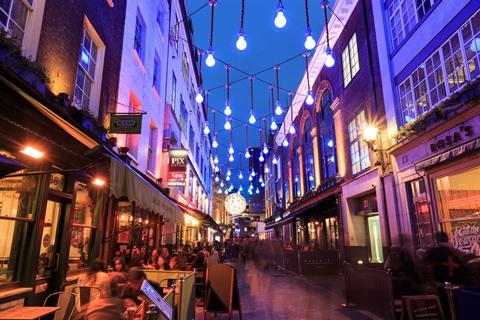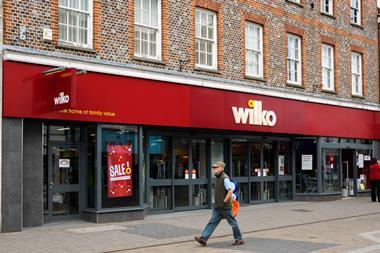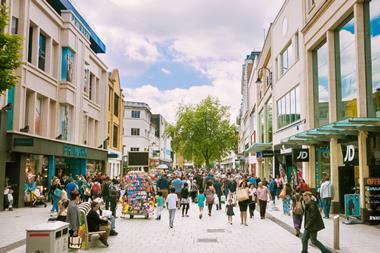Effective planning could drive intelligent developments in towns, including the ways that retail can be bolstered, argues entrepreneur Emma Bridgewater

An attractive centre to any town, village or city is a powerful magnet, drawing people in from near and far.
It encourages them to stay longer, to return, making it a great place to live and work. These are all factors that generate tangible incoming money and, perhaps more significantly, a pervasive mood of success and happiness.
A flourishing centre is a key attribute of a healthy community and an appealing, compelling place.
Successful retail plays a part in the pleasure received from places as diverse as Leek, Norwich and Chipping Norton, from Hastings to Edinburgh and Hay-on-Wye.
As a retailer, which these days means my product is sold online, via wholesale trade and in bricks-and-mortar sites, I believe that good shops are not just where you buy things. They can play a huge role in successful place-making.
Last year, I was fortunate enough to attend Anthropy, a leadership summit held at Eden Project, which convenes leaders to collaborate on the future vision for the UK.
“We are gregarious creatures and many of us share a need to be among other people – walking up and down, bumping into friends, checking out the shops and dropping into our favourite pub or bar”
It is heart-warming to see that place-making is one of the focus topics and recognised as such a critical component to our happy, healthy lives in this country.
We are gregarious creatures and many of us share a need to be among other people – walking up and down, bumping into friends, checking out the shops and dropping into our favourite pub or bar.
In Italy, this everyday evening event is known as la passeggiata. Although we don’t have a name for it, we Brits really appreciate the high streets where mooching about feels pleasant.
Good retailers rode out the pandemic storm and tend to juggle a mix of outlets. While web trading is a very significant aspect of retail, it is certain we still want to go shopping on the high street.
However, you don’t have to look too far to see the perilous state of our high streets and know that the way we approach and support retail in this country needs to change.
One of those areas is the shops themselves. Landlords are crucial and tremendously varied.
Some impressive private landlords exist, such as Howard de Walden in Marylebone, who nurture each lease carefully with a view to curating the perfect retail offering. Their portfolio encompasses small, creative, independent offerings among medium and large brands, mixing food, retail and hospitality among book and homeware retailers so that fashion doesn’t totally dominate.
“Years of austerity and a myopic focus on partnering with major supermarkets have meant a lack of investment in traditional shopping areas”
However, this type of landlord is often in short supply, outnumbered by those who tend to prioritise short-term profit over quality of shopping experience.
Meanwhile, councils – through controlling business rates and supporting infrastructure – have the potential to nurture a thriving retail community.
However, years of austerity and a myopic focus on partnering with major supermarkets have meant a lack of investment in traditional shopping areas and prevented independent retailers from being able to thrive.
All of this is before we approach the important topic of planning, which is a point of contention and nerves for retailers, including myself. It’s the elephant in the room that currently exists when we talk about the high street because it’s an important element that we seem to have forgotten all about.
Good planning controls are essential and create positive and exciting outcomes. We could be using planning to drive intelligent developments in towns and villages, including the ways that retail can be supported and bolstered.
At their simplest, planning measures can help to reinstate the almost completely empty buildings over many shops. If these were accessible, huge numbers could live comfortably and locally to desired amenities.
“We need a long-term vision of what retail in our country looks like and how we can support businesses of all sizes to thrive, in turn helping the communities they are in to benefit”
We must also work out what we really think about protecting our market towns and decide on a planning system that would allow them to work in tandem with the national supermarkets.
Markets have been and should be places for farm shops, local tailors, young art dealers or antiquarian book dealers to thrive. A planning system would transform a largely abandoned marketplace, many of which are now boarded up behind lock and key.
There are so many possibilities, but we need a long-term vision of what retail in our country looks like and how we can support businesses of all sizes to thrive, in turn helping the communities they are in to benefit.
This is one of the many important topics being discussed at Anthropy, and one that in my view is well overdue.
Anthropy is an annual gathering featuring more than 2,000 senior leaders discussing the UK’s most pressing challenges and identifying solutions for a more inclusive, sustainable and prosperous future. Retail Week is a media partner. To find out more about Anthropy, click here. Readers can use the discount code RTWK23150


























No comments yet